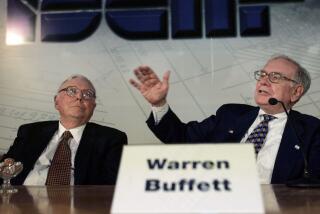Buffett Has a Talent for Finding Good Deals
- Share via
After a career in which he parlayed a $100,000 stake into a multibillion-dollar empire and became an investment legend, Warren E. Buffett’s purchase of a major stake in Salomon Inc., the parent of the investment banking house Salomon Bros., seems only natural.
The 56-year-old Buffett, known as much for his folksy wisdom and unpretentious life style as his financial acumen, has combined a patient, value-oriented stock strategy with a knack for finding investment diamonds in the rough.
The results: years of sturdy growth in value for shareholders of Omaha-based Berkshire Hathaway Inc.-- of which Buffett holds about 45%--and personal wealth that Forbes magazine estimates at about $1.4 billion.
Fortune magazine has called Buffett “the wizard of Omaha.” Commentator Adam Smith, the pen name of George J. W. Goodman, called Buffett “easily the outstanding money manager of our generation.” And author A. David Silver in a 1985 book named Buffett one of the greatest entrepreneurs of the past 25 years.
On Wall Street, Buffett once worked for Benjamin Graham, a Columbia business professor who helped pioneer the “value-investing” strategy of stock buying. The strategy focuses on purchases of stocks trading at prices that are low relative to their book value in anticipation that the market eventually will recognize the underlying value and push the stocks higher.
In 1956, Buffett returned to Omaha and, pooling $100,000 from friends and relatives, established Buffett Associates Ltd. Relying chiefly on a value-investing strategy and Buffett’s acumen, the partnership inflated the original stake into assets valued at an estimated $100 million by the time the partnership was dissolved in 1969.
Four years earlier, Buffett had acquired Berkshire Hathaway, a Massachusetts cloth milling concern with $10 million in assets. Since then, he has turned it into a diversified holding company with about $2 billion in assets.
Buffett’s observations in Berkshire’s annual reports are anticipated as eagerly as the numbers themselves. The 1987 version was typical, with Buffett criticizing the short-term outlook and “hyperkinetic” activities of some investment managers.
“The term ‘institutional investor’ is becoming one of those self-contradictions called an oxymoron, comparable to ‘jumbo shrimp,’ ‘lady mud wrestler’ and ‘inexpensive lawyer,’ ” he stated.
More to Read
Inside the business of entertainment
The Wide Shot brings you news, analysis and insights on everything from streaming wars to production — and what it all means for the future.
You may occasionally receive promotional content from the Los Angeles Times.










